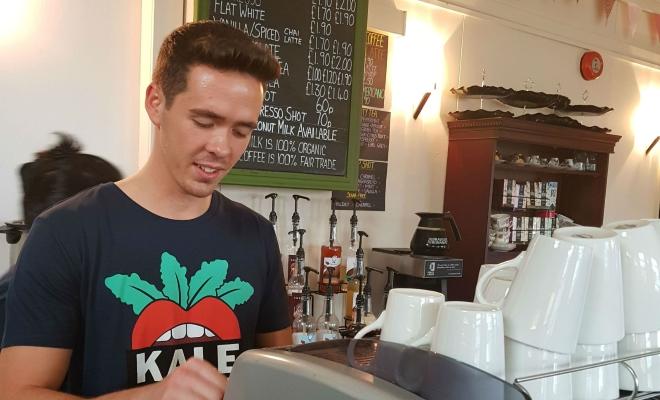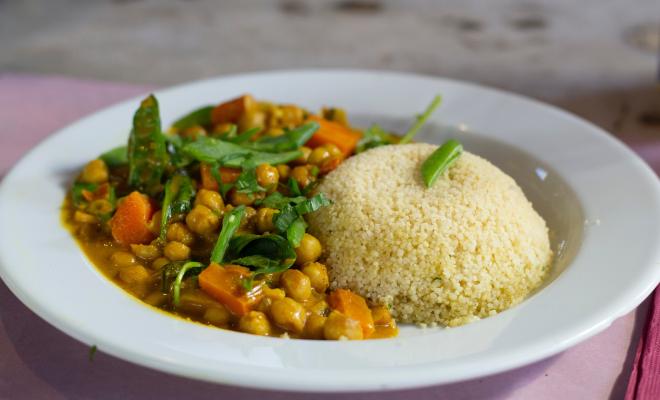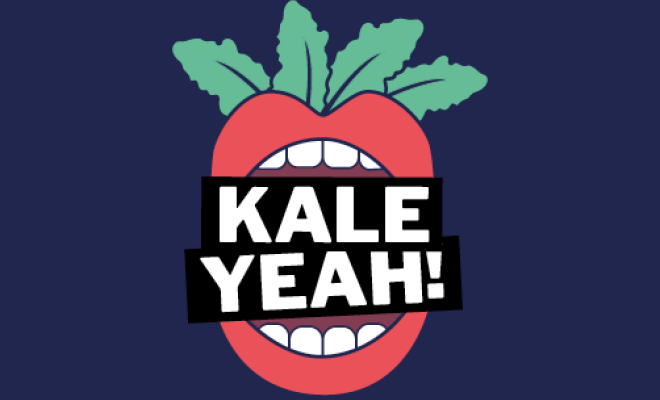13 Dec 2022
Alongside rebalancing menus to serve less meat, fish and dairy, Kale Yeah! Kitchens also encourages caterers to source from better systems – those that operate to higher environmental and animal welfare standards.
We’ve set out what Friends of the Earth defines as “Best”, ‘”Better” and “Basic” standards below. We encourage caterers to aim to source from “Best” and “Better” systems wherever possible. We’ve also provided further information about some key issues, like why poultry, pork and fish aren’t better substitutes for beef and lamb, why we include dairy, and some of the issues around eggs.
"Best" and "Better" standards
Friends of the Earth’s view of “Best” and “Better” standards in terms of British and European accreditations is as follows:
Best:
- Soil Association Organic
- EU Free Range
- EU Organic
- Organic Farmers & Growers
- Pasture for Life
- RSPCA Assured Free Range
- Red Tractor Free Range
- Label Rouge (chicken only)
- See below for fish standards.
Better:
- RSPCA Assured (indoor-produced)
- Pasture Promise (milk)
- LEAF Marque
- Outdoor reared (pigs)
- Outdoor bred (pigs)
- Red Tractor Indoor Enhanced Welfare (chicken)
- See below for fish standards.
According to the RSPCA, there's ample supply of RSPCA Assured eggs, pork and trout. The RSPCA Assured team is happy to speak with caterers in confidence regarding suppliers and availability. Please let us know if you’d like us to put you in touch.
For a detailed guide to sourcing better meat and dairy across 8 impact areas, download Eating Better’s Sourcing Better Framework.
“Basic” standards
“Basic” standards are the minimum standards to which caterers should be operating. However, Friends of the Earth doesn’t endorse these labels or accept them as a guarantee of good environmental or animal welfare standards.
- Red Tractor Assured
- Farm Assured Welsh Livestock
- Quality Meat Scotland
- Farm Quality Assurance Scheme Northern Ireland
- AHDB Beef and Lamb
- British Poultry Council Duck Assurance Scheme
- SAI Global/EFSIS Assured Farm Venison Standard
- British Quality Assured Pork Standard
- Quality British Turkey.
The problem with pork, chicken and fish
When it comes to meat, beef and lamb are often highlighted as the major contributors to environmental damage, due to how their methane emissions fuel climate breakdown. However, chickens and fish make up the vast majority of animals farmed for food globally, and pork has increased rapidly too. For environmental as well as animal welfare reasons, reducing the consumption of beef and lamb but eating more intensively produced chicken, pork and fish isn’t the answer. And overuse of antibiotics in intensively farmed animals poses a severe risk to human health.
Chicken
Chicken production is a cause of serious environmental problems including pollution, water scarcity and deforestation:
- Vast amounts of soya are imported into the UK and EU and fed to farmed chickens. This is fuelling deforestation in the Cerrado and Amazon regions in South America.
- Industrial chicken production emits the highly potent greenhouse gas nitrous oxide, as well as hydrogen sulfide and ammonia.
- Greenhouse gas emissions per gram of protein from poultry are more than 6 times greater than from pulses such as beans, lentils and chickpeas.
More than 70% of chickens raised for meat globally are farmed in intensive systems.
Fast-growing breeds are used, with the birds reaching slaughter weight in less than 6 weeks. This unnaturally rapid growth causes diseases, suffering and fatalities.
The Better Chicken Commitment (BCC) is a collaborative initiative launched by animal welfare organisations to improve the welfare of chickens farmed for meat by 2026. Caterers participating in Kale Yeah! Kitchens are encouraged to sign up to the BCC and work with their suppliers to ensure standards are improved by the deadline.
Pork
Although the direct climate impact of pork production is lower than that of beef and lamb, pig farming has other serious environmental and human health impacts:
- Factory-farmed pigs are fed imported grains and soya – often genetically modified (GM) – grown in areas cleared of Cerrado and forest in South America – devastating those ecosystems.
- Untreated pig slurry contains high levels of harmful toxins that kill wildlife and pollute air, water and soil.
- Nitrates and phosphates can leach into waterways and be washed out to sea causing algal blooms, which reduce oxygen supply and asphyxiate marine life.
- Ammonia and hydrogen sulphide in the air put farm workers and local communities at risk of conditions including lung damage and respiratory problems.
Intensive pig farming involves practices that cause immense suffering. 53% of pork consumed in the UK is imported from the EU, and 70% of that has been produced in conditions that’d be illegal in the UK.
Fish
Over-consumption of fish is also causing problems. Industrial fishing is devastating the marine environment through destructive measures such as:
- Bottom trawling. The practice of dragging weighted nets across the sea floor to capture fish. Researchers have recently found that bottom trawling releases as much carbon as the entire aviation industry.
- Bycatch. Dolphins, turtles, sea birds and other animals are unintentionally caught and killed in the nets or thrown back injured and dying.
- Dynamite fishing. Using explosives to stun or kill schools of fish for easy collection, damaging coral reefs in the process.
- Irresponsible prawn and shrimp farming, which is destroying coastal mangrove forests.
- Discarded fishing nets that cause horrific injuries and painful deaths to wildlife.
Fish farming in the UK is the second largest area of farm animal production after chickens. Problems with farmed fish include:
- Overcrowding. Farmed fish are kept in over-crowded, dirty cages that prohibit natural behaviour. This causes mental and physical suffering.
- Antibiotics. In order to fight off infections and parasites, farmed fish are routinely treated with antibiotics.
- Infections transmission. Diseased fish can escape and transmit infections and parasites to wild populations.
- Algal blooms. Effluent from the cages seeps out into surrounding waters and causes algal blooms that result in dead zones devoid of marine life.
"Best" and "Better" certifications for fish
Best:
- Organic
- Marine Conservation Society rated 1-3 (wild caught)
- Marine Stewardship Council (MSC) approved (wild caught)
- Locally-caught fish.
Better:
- Aquaculture Stewardship council (ASC) approved (farmed)
- RSPCA Assured trout (farmed)
- Global Aquaculture Alliance "Best Aquaculture Practices" (BAP) label
- GlobalGAP.
Avoid:
- Any species on the Marine Conservation Society red (Fish to Avoid) list
- Scottish farmed salmon (unless organic) due to its environmental impact.
Why we include dairy products
Dairy production has similar environmental impacts to beef production. All bovines produce large amounts of methane, and dairy cows who aren’t raised on 100% pasture are given feed including cereals and some soya from South America. Dairy milk is much less sustainable than plant milks, although there's also some variation between plant milks.
There are also serious animal welfare issues in the dairy industry, including:
- Modern dairy cows have been selectively bred to produce higher and higher milk yields at the expense of their health and wellbeing.
- Dairy cows are increasingly being kept indoors in "zero grazing" systems, which deny them a natural life outdoors.
- Lameness, a painful condition caused by prolonged standing on concrete floors and poor nutrition, is prevalent across the dairy industry.
A note on eggs
The cheapest eggs typically come from caged hens. Conventional battery cages are banned in the UK and the EU, although many countries still aren’t compliant. "Enriched" cages, which are permitted, are only very marginally bigger than conventional cages.
Just over half of UK egg production is from free-range hens, just under half from caged hens, and approximately 1% from hens kept in barn systems (uncaged).
We encourage caterers participating in Kale Yeah! Kitchens to source all shell and liquid eggs to at least RSPCA Assured standard, and to ideally work towards free-range or organic standards.
Local and seasonal
We strongly encourage caterers to buy directly from local farmers that adhere to high environmental and animal welfare standards where possible. This can boost the local economy and buoy the market for fresh, seasonal, sustainable produce.
Sustainable Food Places has put together some useful information to help caterers source locally.
See Eat the Seasons and the BBC’s food by month recipes for seasonal inspiration.




